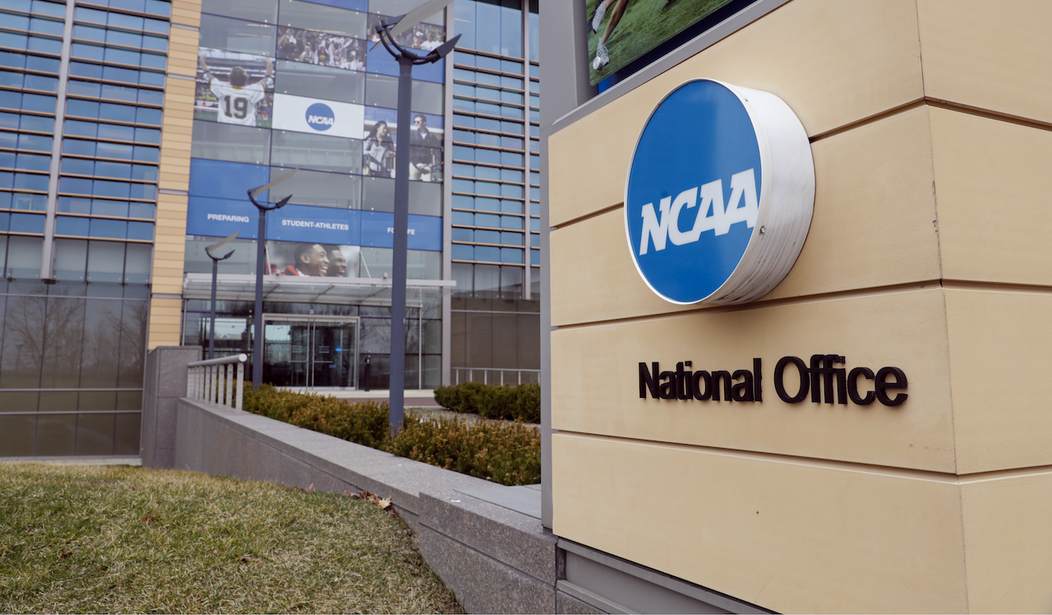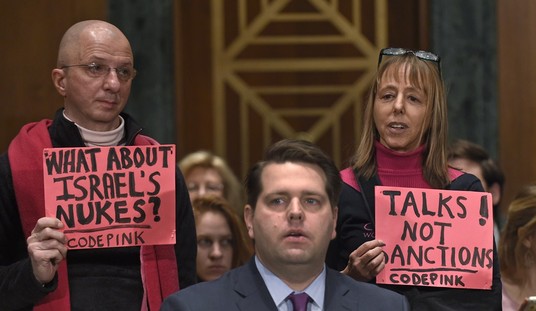As we covered here earlier, yesterday, Florida Governor Ron De Santis made a high-profile public event out of his signing into Florida law a prohibition on biological males competing as transgender females in school sports in Florida. In his public comments, De Santis called out the NCAA and business groups who had urged him to not sign the legislation.
“You can’t be cowed by these organizations, or particularly by woke corporations from doing the right thing. And so my view was throughout this whole time, we have to protect our girls, it is discriminatory to force them to compete against biological males,” DeSantis continued. “And so if the price of having a tournament is that I have to deny equal opportunity to hundreds of thousands of young girl and women athletes throughout Florida, I am much more willing to stand with the girls. And to hell with these events.”
But the reality was that De Santis had almost no exposure on this issue and the NCAA had already folded its hand by showing it was bluffing. It threatened smaller states like Idaho and South Dakota that it would not hold NCAA Championship events in their states if they passed legislation that protected young girls from having to compete against young boys who wanted to play as girls. But the NCAA knew that, in the final analysis, the forces aligned against its policy would force it to capitulate.
When I first wrote on this topic back on March 21, I said the way to beat the NCAA was to create an environment where the NCAA feared that a group of powerful and important states — especially powerful and important in the NCAA — would constitute a real threat to leave the NCAA and form their own association for intercollegiate athletic competitions.
The path to bending the NCAA to the will of the Red States — or to at least neutralize it as an advocate for left-wing social justice causes that spring forth from college campuses — is to threaten that revenue stream.
It should be a relatively simple matter to draft a piece of legislation that accomplishes the simple goal of providing sporting competitions at the university level and below which limit the participants to being biological females possessing the “xx” chromosome and female genitalia at birth. If such legislation was passed in every state that is currently controlled by Republicans at the legislative and executive levels, that would include 24 states on the list.
If you consider the major universities in those 24 states and cross-reference them against the dominant college football programs over the past 40 years, you end up with the following schools as potentially leaving the NCAA and destroying the revenue-making ability of the remaining institutions from other states:
SEC: Alabama, Georgia, Florida, South Carolina, Tennessee, Mississippi, Mississippi St., Louisiana St., Arkansas, Missouri, and Texas A&M.
Big 12: Oklahoma, Oklahoma St., Texas, Texas Tech, Iowa St., and West Virginia
ACC: Florida St., Georgia Tech, Clemson
Big 10: Ohio St., Nebraska, Indiana, Purdue, and Iowa.
Pac 12: Arizona and Arizona St., and Utah.
On April 13, shortly after the NCAA’s highest-profile event of the year, the NCAA Men’s Basketball “March Madness” tournament, I wrote about the NCAA Board of Governors issuing a public statement on the issue of states passing legislation prohibiting transgender participation in girls sports. The statement — a response to the introduction of the Florida legislation — reinforced the NCAA’s threat that it would not host events in states that passed such legislation.
When determining where championships are held, NCAA policy directs that only locations where hosts can commit to providing an environment that is safe, healthy and free of discrimination should be selected. We will continue to closely monitor these situations to determine whether NCAA championships can be conducted in ways that are welcoming and respectful of all participants.
But I also noted in that story that the NCAA was going to soon be put to a test of the “courage of its convictions”:
[T]he NCAA Men’s College Baseball Championship and the Women’s College Softball tournament will both be underway in approximately 6-7 weeks, around Memorial Day Weekend.
As part of COVID-related changes, the Sub-Regional and Regional rounds of each tournament will be held at pre-determined locations in 2021, rather than being hosted by teams who earned the right to host the events as a result of their performance. Tennessee and Mississippi are states that would normally be considered for hosting opening rounds.
But the more difficult question for the NCAA might arise in connection with the traditional location for the Championship Play in each tournament — Omaha, Nebraska for the men, and Oklahoma City, Oklahoma for the women.
I specifically mentioned Tennessee and Mississippi because both had just passed high-profile legislation similar to that introduced in Florida, and signed by Gov. De Santis yesterday.
As I noted, because of COVID concerns this year, the NCAA decided it would pre-select competition locations for the baseball and softball championship tournaments, and not award them based on schools’ on-the-field success during the season. Women’s softball has finished its sub-regional and regional rounds. Men’s baseball will be playing its sub-regional rounds this coming weekend.
Here are the states where Women’s Softball was played:
Florida, Tennessee, Oklahoma, Alabama, Missouri, Texas, Kentucky, Arizona, Arkansas, Louisiana, California, and Washington.
The Women’s College World Series will be held this coming weekend in Oklahoma City, Oklahoma.
Here are states where the Men’s Baseball regionals will be played starting this coming weekend:
Florida, Arkansas, Texas, Louisiana, Mississippi, North Carolina, Indiana, South Carolina, Oregon, Arizona, and California.
Had the NCAA’s threats been meaningful, you would have seen these “pre-selected” sites be at colleges in Michigan, New York, Illinois, Virginia, and Colorado. All have major universities capable of hosting these events even if teams from those states didn’t qualify for participation. That was the basis in years past for selection, but not this year — the NCAA had the entire country to choose from.
Florida became the 8th state to pass legislation regarding transgender participation in girls’ sports, with the others being Alabama, Arkansas, Mississippi, Montana, Tennessee, West Virginia, and Idaho. The Idaho statute has been blocked by a federal judge from going into effect. South Dakota Gov. Kristi Noem sent a bill back to the South Dakota legislature for changes, but then adopted a state-wide policy applying to public schools on the subject.
As many as 30 states have either passed legislation or have some form of legislation pending addressing the subject. Included in that list are all the states where these events are being held, other than California, Oregon, and Washington.
The NCAA knows it cannot antagonize the powerful major college athletic departments in most red states — so it didn’t do so even when it had the perfect opportunity to “live its principles.”
It didn’t need to do it in football. It could have flexed its muscles in softball and baseball, but it didn’t even have the will to do that.
I expect we’ll now see similar legislation move quickly through states where Republicans control the state legislature and the governorship. I don’t expect we’ll hear much going forward out of the NCAA.













Join the conversation as a VIP Member